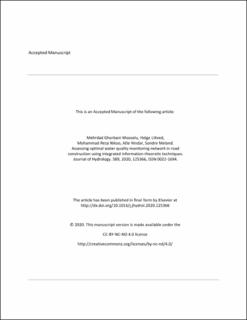Assessing optimal water quality monitoring network in road construction using integrated information-theoretic techniques
Peer reviewed, Journal article
Accepted version
Permanent lenke
https://hdl.handle.net/11250/2672679Utgivelsesdato
2020Metadata
Vis full innførselSamlinger
- Publikasjoner fra Cristin - NIVA [2149]
- Scientific publications [1172]
Originalversjon
Journal of Hydrology. 2020, 589, 125366. https://doi.org/10.1016/j.jhydrol.2020.125366Sammendrag
The environmental impacts of road construction on the aquatic environment necessitate the monitoring of receiving water quality. The main contribution of the paper is developing a feasible methodology for spatial optimization of the water quality monitoring network (WQMN) in surface water during road construction using the field data. First, using the Canadian Council of Ministers of the Environment (CCME) method, the water quality index (WQI) was computed in each potential monitoring station during construction. Then, the integrated form of the information-theoretic techniques consists of the transinformation entropy (TE), and the value of information (VOI) were calculated for the potential stations. To achieve the optimal WQMNs, the Non-dominated Sorting Genetic Algorithm II and III (NSGA-II, and III) based multi-objective optimization models were developed considering three objective functions, including i) minimizing the number of stations, ii) maximizing the VOI in the selected network, and iii) minimizing redundant information for the selected nodes. Finally, three multi-criteria decision-making models, including Technique for Order Preference by Similarity to Ideal Solution (TOPSIS), Preference Ranking Organisation Method for Enrichment Evaluations (PROMETHEE), and Analytical Hierarchy Process (AHP) were utilized for choosing the best alternative among Pareto optimal solutions considering various weighing scenarios assigned to criteria. The applicability of the presented methodology was assessed in a 22 km long road construction site in southern Norway. The results deliver significant knowledge for decision-makers on establishing a robust WQMN in surface water during road construction projects.
Beskrivelse
Embargo until 02 August 2022

